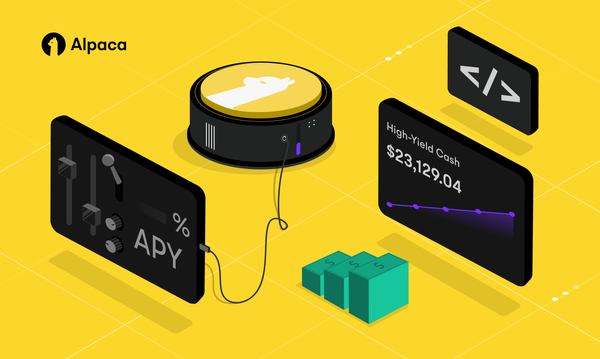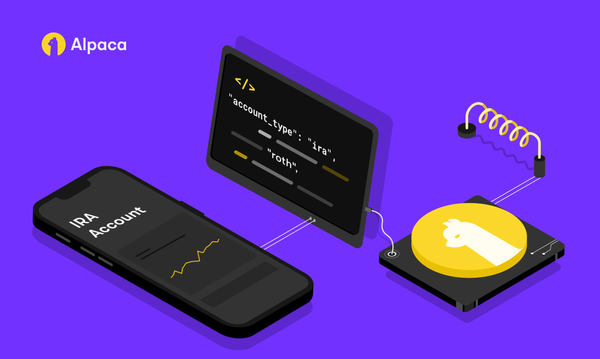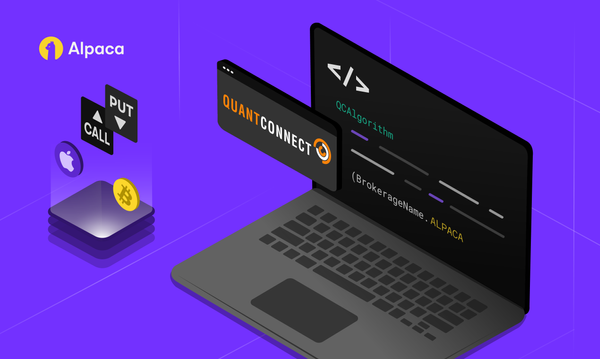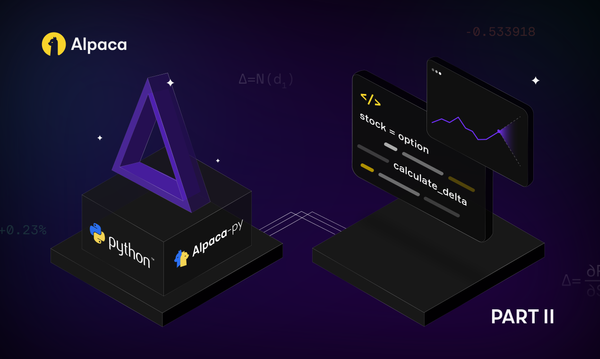Diversity in Web3 #026
We interviewed Diana O’gilvie, we talk about starting in web3 and the process of learning, what can we do to have more diversity in web3 and how to find your community.
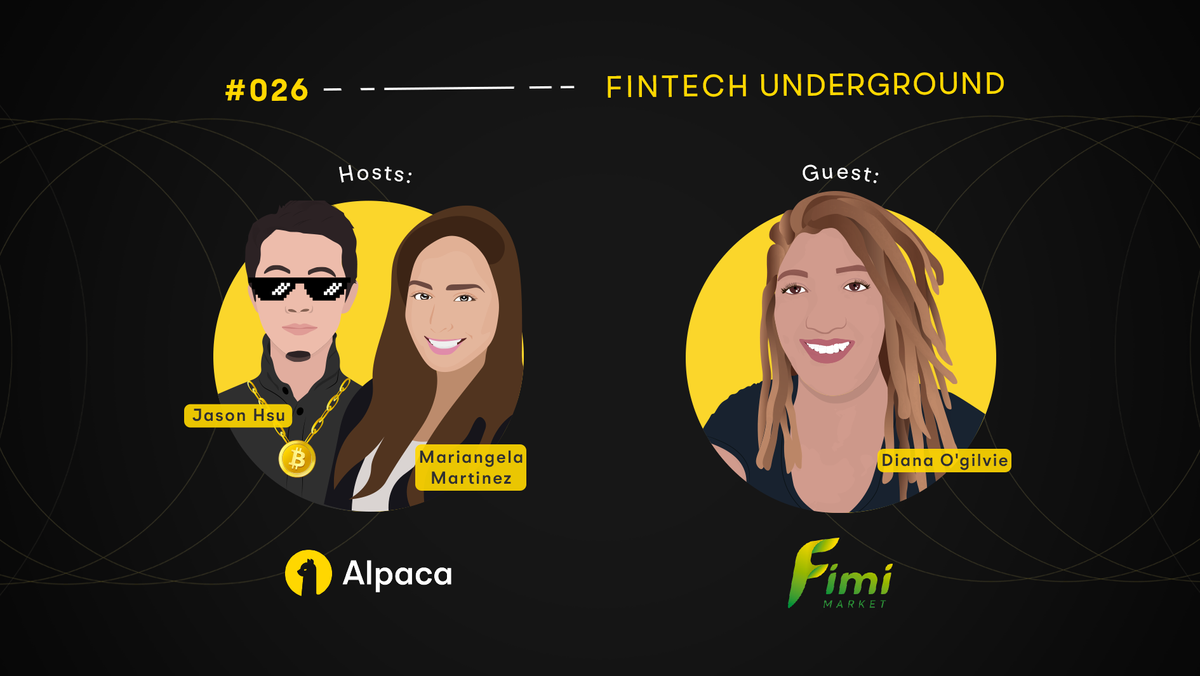
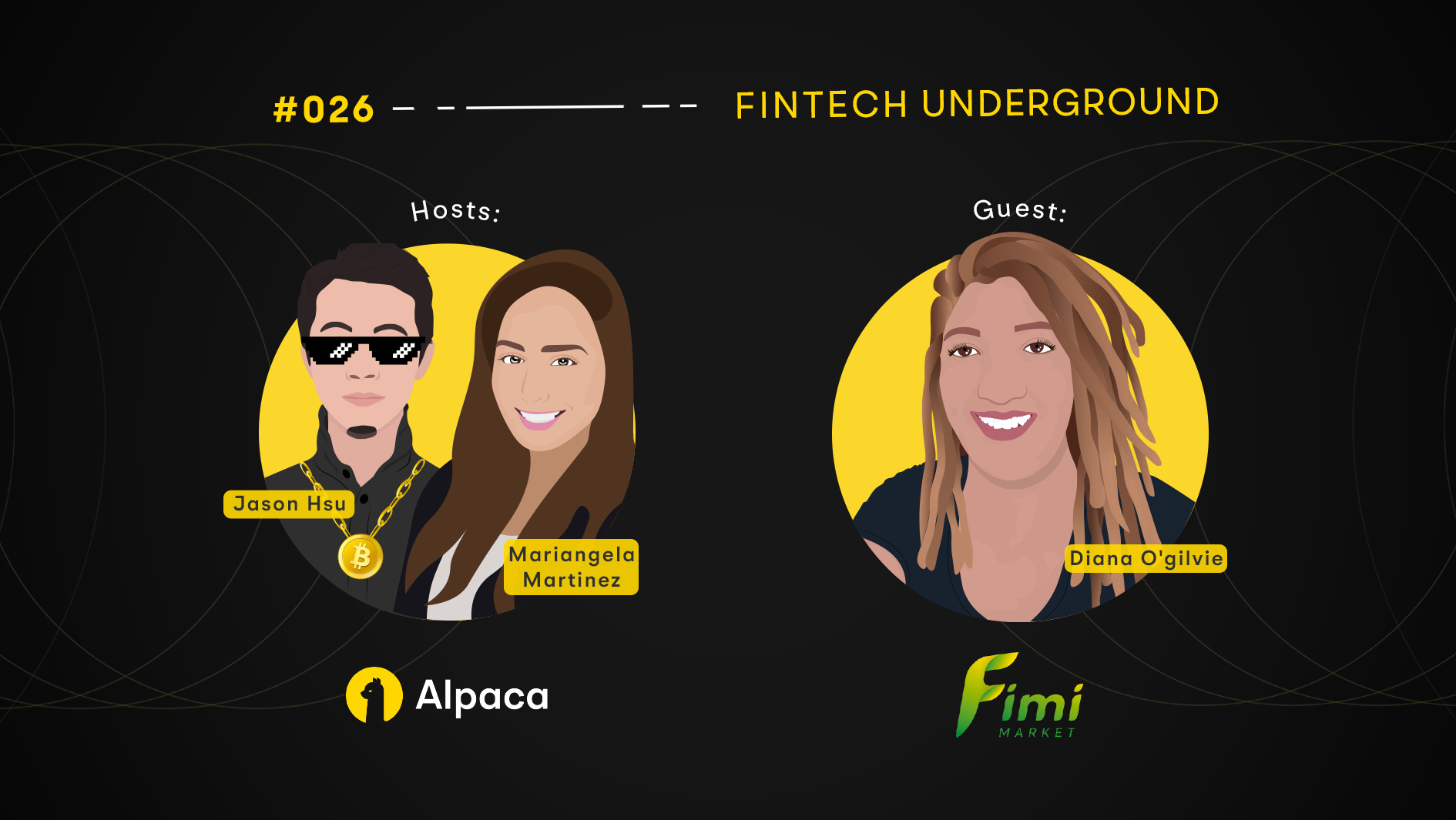
All views and opinions expressed by the guest speakers are solely their views and opinions and do not reflect or represent the views and opinions of Alpaca Securities LLC, Alpaca Crypto LLC, and AlpacaDB. The guest speakers' opinions are based on information they consider reliable and therefore Alpaca Securities LLC, Alpaca Crypto LLC, and AlpacaDB do not warrant its completeness, accuracy and it should not be relied upon as such.
The content is for general informational purposes only. Alpaca Securities LLC and Alpaca Crypto LLC do not recommend any specific investments, investment strategies or cryptocurrencies.
Fintech Underground by Alpaca is a podcast devoted to all topics related to stock trading and APIs. From trading with algorithms or connecting apps or building out services, we aim to bring light to the different corners of Fintech.

TL;DR
In episode 26 of Fintech Underground by Alpaca, we interviewed Diana O’gilvie, Communications Manager at Fimi Market. We talk about starting in web3 and the process of learning, what can we do to have more diversity in web3 and how to find your community.

Find the full transcript below. To hear more of the most interesting Fintech companies speak about their experience in the industry, check out our other episodes below.

Full Transcript
Alpaca is a developer-first startup focused on building open APIs for stock and crypto trading, investing, and embedding. You can learn more by visiting our website at alpaca.markets. You can also find us on Twitter @AlpacaWeb3 or join our discord community also with the invite link @AlpacaWeb3.
Mariangela: Hello, I'm Mariangela Martinez, host of Fintech Underground, and this is Jason Hsu, our crypto evangelist at Alpaca. We will be hosting today's podcast on Diversity in Web3. Our guest today is Diana O'gilvie, Communications Manager at Fimi Market.
Any topic talked about in this podcast is not financial/investment and/or tax advice. We encourage our listeners to seek individual advice should they team it necessary.
Diana, would you like to tell us a little bit about yourself?
Diana: Hi, I am Diana O'gilvie. Thank you so much for having me on here, Mariangela and Jason, as you say, I am the Communications Manager for Fimi NFT Marketplace. I am actually quite new to the web3 realm, coming up on my one year anniversary. But I have extensive background as a creative, in marketing, video production, podcasts and writing. So I consider myself a storyteller and I'm just embarking on this web3 journey, literally one story at a time.
Mariangela: When did you start in web3? How long ago?
Diana: Yeah, so, coming up on my one year anniversary, I started October last year and it's an interesting story because my dear friend, Miguel Adwin, who is the CEO of Fimi Market Inc. Reached out to me with an opportunity, as he knows I was a freelancer, and he asked me to write a white paper for this "project" that he was working on. So that's how I started out, I wrote a white paper for Fimi Market and then it just grew from there. I have tremendous amount of confidence in Miguel. Yeah, you see at the time, and I think now too, especially in web3, people just keep saying projects and projects instead of, you know, it's a career. And I don't, it's something that I'm still trying to wrap my head around. So I'm just actually really trying to use the jargon that's current.
Jason: Yeah, that's a very good point. And that's new information to me. I didn't know, I think when we first spoke that you wrote the white paper for it.
Diana: Yeah.
Jason: And I think that was like two, three months in.
Diana: Yeah, man.
Jason: Yeah, you guys came a long way. I'm looking at the website. There are now NFTs being featured on the homepage and that was not the case when I first saw it, right?
Diana: No, no. I mean, we've grown and we're so proud. We're so proud of our artists and our marketplace and you know, there's just more things to come as we develop as time goes on.
Mariangela: So before the white paper, were you aware of web3 or had any knowledge?
Diana: So I kept hearing about this cryptocurrency business, you know, this term floating around, but I didn't do a deep dive until the white paper.
Mariangela: Oh, I see, Okay. And that's when you started learning everything?
Diana: Yeah. Like literally dove off the deep end.
Mariangela: Yeah. So you were a photographer/film. Have you turned your photos or films into NFTs?
Diana: You know, I haven't because what is happening with me, partially as a creative, it's actually trying to find the time because a community's really important to any of the NFT projects or offerings that I may have. And right now, the time commitment, FIMI keeps me really busy, but I do have it on the back burner to turn some things into NFTs, I'm just, you know, Elizabeth Gilbert in her book, Big Magic says when an idea visits you have to sit down and agree to it. And I haven't found an idea that I'm in agreement with as yet.
Mariangela: Okay. It'll come to you then.
Diana: It will come to me.
Mariangela: Yeah. What do you find most exciting about web3?
Diana: You know, what I really find exciting about web3 is the, and this might sound a little amorous, but it's the decentralization of it all. The fact that we can all get in on a level playing field and create worlds and build worlds that are a departure from our reality. And you know, of course the skeptic in me does say that, you know, we will bring our prejudices and biases and whatnot to that space, but in this purest form, I really like the decentralization idea of it all, and especially for women and people of color, we haven't been at the forefront of these big technologies, you know, Gold Rush and you know, any other things that you wanna name that we haven't had the access to. And I think web3 will level the playing field for people of color worldwide, and that's what makes me super excited.
Jason: Yeah, I think we could use more of that representation. If you go to Devcon or EthDenver, it's like bunch of dudes. But you see a bit of that changing at Consensus and some institutionalized conferences. So it's good.
Diana: Yeah. I attended my first NFT conference in New York and I was bowled over by the lack of diversity. I mean, so much I wrote a blog on FIMI for it, you know, because I don't know how you're having a talk on diversity and it's like five white guys on the panel like that as in Jamaica, we'll say, make that make sense. That doesn't make sense. So, you know, and I could count on one hand the women that were speakers that I attended. So it's, yeah, we have worked to do.
The talks that I did attended that had, that were actually satellite events, you know? At the marquee where it was like the central hub, it was very techno bro, and you know, sell and this and we're bullish, and I was like, wow. And especially someone who's still relatively new to the space, I was just so overwhelmed. And to me, it just, the lack of diversity just stood out like a sore thumb.
Jason: Mm-hmm. Are you still in the New York area by any chance or?
Diana: No, no, I'm in Atlanta.
Jason: Okay. Okay. Yeah, cuz right now there's Mainnet, another conference happening. And that's so yesterday till Friday, and we're sponsoring another site event tomorrow. Just figuring if you were in the area, you could come by and use food and drinks and rooftop.
Diana: Oh, I wish I were, I would've definitely swung by.
Jason: Yeah. Yeah, it's all good.
Mariangela: What is a struggle you have faced in web3 with people or the industry itself?
Diana: Well, I think for me, the struggle that I have faced is, so I find web3 to be a Dr. Jekyll-Mr. Hyde kind of vibe, you know. Where I've met some wonderful people, very given with information, really free flowing, no question I ask is stupid, and I love that space. And then on the flip side, where you have, where people who are just more, they mirror what I saw at the Marriott Marquis at NFT NYC. It's very bullish and not very forgiving, you know, there's steps along the way that you take when you're building a company and if you fall short of that, there's hell to pay in the Discord group. There's hell to pay in the telegram groups.
So it's just recognizing that there's a human being at the end of that computer, at the end of that message, at the end of that phone, where I find that there's just this lack of humanity that festers in web3. And you just have to really be whew. You just really have to have this armor about you, you know?
Jason: Yeah, yeah. That's a good point cuz I think that's how crypto somewhat brought twitter back to life cuz people got the, I mean, it's part of the future that you get to kind of stay anonymous, and you just get to express certain views that you feel like are shielded, wouldn't fall back to your real identity. People have been careless, and that has come back to bite, like some fairly large NFT projects that the creators or founders have expressed some extremist views couple years ago, and people didn't know, but it would be discovered later and then, you know, the price would dump, like, "Oh, okay, well, you had a nice community, but, we can't support a founder who has expressed these kind of opinions.
Diana: Yeah. Wow. These are the things that you really have to be careful about, you know? I mean, we're human beings with hearts beating inside of us. And the whole anonymity of web3 and the mystery. And then you have your avatars and that's all great. But at the end of the day, when you peel that back, come on. It's about your community and the community is the beating heart of any project. If you don't have a community. I don't know what you do in web3.
Jason: Yeah, I do think you should try out some other conferences too. Cuz I felt NFT NYC was a different crowd. I think, I mean, it's beneficial to you cuz you're running an empty marketplace. So you are gonna run into more artists there. But you will run into guys or people with, where their first exposure to web3 is through NFTs. Like they didn't build anything. Like, they didn't start with crypto or, it's just they had money and they threw it at something new and quirky. And yeah, it's a different set of personalities at that event versus just some conferences, like even the one this week, I think.
Diana: Yeah. Well, we're definitely planning out our 2023 calendar and would love to take some recommendations from you.
Jason: Sure, sure. Yeah.
Mariangela: Oh, Jason knows everything.
Jason: So.. I wouldn't say everything. I just have a lot of people just tell me things, invites to stuff. Yeah.
Diana: Cool.
Mariangela: Yeah, he's, he's a good contact to bump with. So do you rely on anyone for support?
Diana: Oh, absolutely. I mean, just looking at my team, for me, I like to say FIMIlia, but they hate when I say that.
Mariangela: Oh, I love that.
Diana: Don't you like it? I like it. They think it's so corny, but I like it. I say team.
Mariangela: It is. It's corny, but I like it.
Diana: Yeah. I mean, looking at my team, you know, just starting with our CEO, Miguel Adwin, who is just this brilliant mind, super, super patient. Let me tell you something. This man has a patience of Job, to how he gets into our groups and he's talking to the artists and walking people through the onboarding on the NFT platform. I mean, even when we had our launch party at Juneteenth in New York, I mean, he was pulling out a hammer and hanging that printed NFTs on the wall. So there is nothing too big or anything too small that he would you get his hands in. Our CMO, Mimi Lin, who is a force of nature to be reckoned with. I mean, 20 old years of marketing experience, I learned so much from her with every interaction. And Dixie Gilbert, rocking free world. She is one of those given, generous, generous persons. I can hit her up with a question, anything, and Dixie will answer in great detail, no stone unturned, so just looking inward at team FIMI it's just really such a good support for me as I do my job.
Mariangela: Yeah, that's good. I mean, I think it's necessary in this industry that's changing so fast.
Diana: Yeah, for sure. It is. And like it changes on a dime, as you know.
Mariangela: Right.
Jason: I think I met Miguel in Miami during Dcentral Con last year. Came to our event. He's a very pleasant guy. He's really open to ideas.
Diana: Yeah. We have that picture with the thumbs up and like we call it, that's like his..
Jason: Oh yeah. Yeah. I still need to share that on my socials.
Diana: He has his thumbs up, I'm like dude, your finger has to be like a more forceful thumbs up, not a weak thumbs up.
Jason: Yeah.
Diana: We gave him so much shit.
Jason: Yeah. Well, next time you guys have an event in New York, I'd love to come by and support it.
Diana: Oh, for sure. Thank you so much. Yeah, we'll definitely have you on.
Mariangela: Do you have several events during the year in like parts of the country?
Diana: No, not yet. Juneteenth was our first, that was like our launch party to say, you know, Team Fimi is here, we're live, the platform was live. So we just thought it'd be fitting to do so on Juneteenth. So we don't have any in-person events as yet, but that's definitely in the books. Right now we're just really working on making the platform more robust and onboard more artists, more creators, so they can actually earn a decent living with their art, eliminating the middle men that have stood between them and earning a decent paycheck for so long.
Mariangela: Yeah. Wow. Now do you admire anyone in the industry but out of Fimi?
Diana: So, yeah, I really look up to Iris from Umba Daima. And like me, she's of Jamaican heritage and they are really, really focusing on education. I've been to a couple of their workshops here in Atlanta and you know, we've talked and it's just such a, again, another such space that is given. They do these free networking events across the country, which is really, really great. So I really like what Umba Daima is doing.
Mariangela: Nice. And how did you meet her?
Diana: Twitter!
Mariangela: Really?
Diana: Yeah, it was just scrolling through Twitter and saw that they were having an event here and, you know, when I started learning, I went down the Twitter rabbit hole, and I started following Umba Daima and learning about Iris and what they were doing over there. And I saw they had an event, it was not too far from my house, so I went and it was really cool. Yeah.
Mariangela: Wow, that's so lucky that it was right near your house.
Diana: Yeah. Yeah. I mean, you know, when you talk about coincidence, but you know, it was really fortuitous for me.
Mariangela: Right, yeah. Are there any diverse trends that you're following closely?
Diana: Yeah. So part of what the barriers for web3 is access, right? And I'm really liking what I'm seeing in terms of, what I like to call those tethers between web2 and web3 that's moving in. So, for instance, using POAPs, as part of a marketing campaign to show that you attended something and using that to make a loyalty program for customers. So even something that's like showing an NFT to get into an event because these are the things that people, because web3 is still so new. I mean, we've been in it a few years, just a year for me, longer for both of you, I know. But people in order to have some kind of comfortability with onboarding into web3, there needs to be these tethers.
So I like those real world applications into web3. You know, putting it on your, your goggles and taking part in a metaverse, buying some land in the metaverse, but still coming back to reality. Those are the things that I'm really interested in following down the rabbit hole.
Mariangela: Now, so going back to diversity, how do you think we can cultivate a culture of inclusivity into web3?
Diana: You know what? Education is key and it's putting out bits of education, be through social media, jumping on YouTube, and you know, doing webinars, doing courses. I think that's really, really key and targeting audiences that have not have been serviced by web3, you know? Right now we see that there are courses in school, especially in high school. I met some really cool kids at the NFT NYC in New York. And they have like an after school NFT club. So it's really driving home and getting into those communities, into those community centers and appealing to brands.
I mean, Nike is knocking everybody out of the park right now with their NFT efforts. That's why everybody's going to them for sponsorship. But, you know, partnering with brands that are well known in the community, especially in the people of color communities, so everybody's got a pair of Nikes, you know?
And finding that sweet spot where it's not just education, but it's fun and showing people that, hey, you can eradicate some of these middle men between you and your paycheck, because at the end of the day, you want something that is more fulfilling for yourself, but also something that can pay for a meal or pay a bill, realistically speaking.
So education is key and putting it in bits of packages that make sense. Digestible packages because this whole decentralization stuff can get really, you know, like Charlie Brown. So it's to make it exciting and tell stories and just make sure that the engagement is up and the interest. Cause people gotta be interested.
Jason: When you say you saw kids formed this after school NFT Club. How old are they?
Diana: They were teenagers. They look to be 15, 16.
Jason: Oh wow.
Diana: It was interesting because it was like one of those moments where it was another diversity panel with all white dudes on there. And I don't know if it was a planned moment, if it was orchestrated, but whatever it was, it was really effective. And one of the panelists, like all the kids were in front and they all had on these sweatshirts that said, "I am not a gang member." And he said, "you know what, you guys should be up here." And then everyone in the panel got up and those kids got up and talked about what they were doing in school, and I thought it was really cool. I wrote about it on our Fimi blog. So y'all can go there and check that out.
Jason: Yeah. Yeah. Okay. Yeah, we'll definitely read about it. I need to know how far into the future I'll be irrelevant. Cause like, I'm hearing in China they have smart contract writing courses for elementary school kids. I'm like, okay.
Mariangela: Oh wow.
Diana: Come on.
Mariangela: That's news to me.
Diana: I'm not mad at that at all.
Jason: But I see that you guys have increased the inclusivity. Cuz I thought originally it's just like the Jamaican spin and then now there's this whole like bipoc. What does it stand for? B I P O C, is it black, indigenous, and person of color. Yeah. There you go. Like you're including more minority groups. I think we should introduce you to this.. we had another episode where we interviewed a BluDAO, it's like a woman focused DAO, and Cryptolingo, they do like web3 education. Maybe there is something you guys can do together there.
Diana: Oh man. Yes.
Jason: Yeah. Yeah. I think there's like some mission values that are aligned there.
Diana: Yeah, absolutely. I appreciate it. Yeah. But just to back it up a bit, Jason, we've always been, you know, bipoc, the spin is Jamaican because Miguel is Jamaican. And he is proud of his culture, as am I. So, Jamaican culture is one of those things that is known worldwide, you know, Reagan music and/or Dancehall, and Husain Bolt, and Bob Martin. So the Jamaican spin is the hook, but we've always been representing the underserved.
Jason: Gotcha, gotcha. Well, I'm feeling it cuz like the messaging is now more clear cuz I thought that was just like the subtext. But now when I look at it, it's like, yeah, I get what you're trying to do. Yeah.
Diana: Yeah. Thanks for that. Yay. Marketed!
Mariangela: Wow. So it's been a crazy year for you with web3. Would you like to say anything else to our listeners?
Diana: Well, thank you so much for having me. Thanks for rocking with me for this past half hour. So, now is the time to get into web3 if it is not too late. That's what I would say to anybody listening to this. Get in there, get into some Twitter spaces. We host the Twitter spaces every two weeks on FIMI, on the score market, where I host it and we talk about various things. The next one we have coming up, we're talking about the Eth merge and just get on there.
And the one way to eat an elephant is one bite at a time. So don't be overwhelmed. I certainly was. I certainly was overwhelmed, but you take it day by day. If you have a half hour jump on a Twitter space, go on YouTube University and learn some terms. Ask some questions and just find the community that works for you. Because despite, you know, most of what I said, I don't wanna paint this dismal picture, but I've found communities that have just been really giving and really nurturing in this space. So go forth and conquer.
Mariangela: Cool, yeah.
Jason: Yeah, that's a great message.
Mariangela: Yeah. So Diana, thank you so much for joining us in our podcast. It was a pleasure having you here with us, and thank you for sharing your thoughts and giving us the time, for sure.
Diana: I really appreciate it. Thank you guys for having me.
Mariangela: Of course. You can find Diana on Twitter @Didoo1876, and FIMI market website is nft.fimi.market.
To our listeners, check out Alpaca for more information about stock and crypto trading. And always remember to do research before investing.
Every situation is different and you are encouraged to seek independent, legal and investment and/or tax advice. Cryptocurrency is highly speculative in nature, involves a high degree of risks such as volatile market, price swings, market manipulation, flash crashes, and cybersecurity risks. Cryptocurrency is not regulated or is slightly regulated in most countries.
Cryptocurrency trading can lead to large, immediate and permanent loss of financial value. You should have appropriate knowledge and experience before engaging in cryptocurrency trading.




